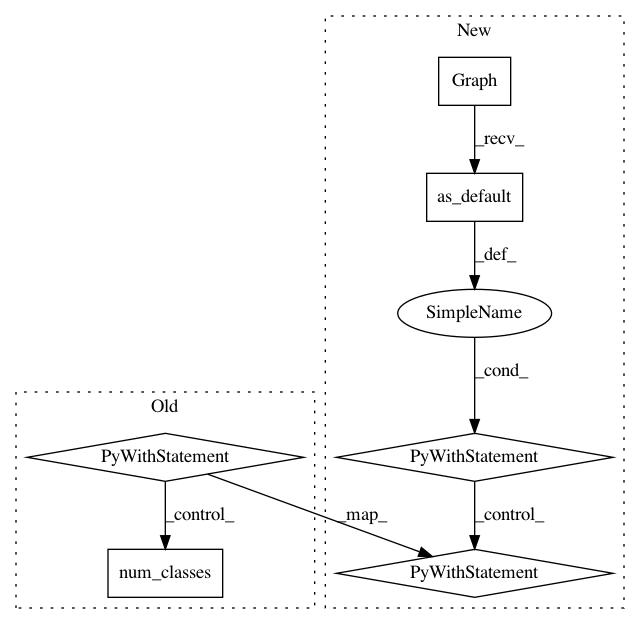0a68639f4c33323274e7829b9349d0170dc6c8ea,train.py,,classifier,#,67
Before Change
best_va = 0.0
with tf.device(ARGS.train_device):
global_step = tf.Variable(0, trainable=False, name="global_step")
// Get images and labels
with tf.device("/cpu:0"):
images, labels = DATASET.distorted_inputs(ARGS.batch_size)
log_io(images)
// Build a Graph that computes the logits predictions from the
// inference model.
is_training_, logits = MODEL.get(
images,
DATASET.num_classes(),
train_phase=True,
l2_penalty=ARGS.l2_penalty)
// Calculate loss.
loss = MODEL.loss(logits, labels)
tf_log(tf.summary.scalar("loss", loss))
// Create optimizer and log learning rate
optimizer = build_optimizer(global_step)
train_op = optimizer.minimize(
loss,
global_step=global_step,
var_list=variables_to_train(ARGS.trainable_scopes))
train_accuracy = utils.accuracy_op(logits, labels)
// General validation summary
accuracy_value_ = tf.placeholder(tf.float32, shape=())
accuracy_summary = tf.summary.scalar("accuracy", accuracy_value_)
// read collection after that every op added its own
// summaries in the train_summaries collection
train_summaries = tf.summary.merge(
tf.get_collection_ref(MODEL_SUMMARIES))
// Build an initialization operation to run below.
init = [
tf.variables_initializer(tf.global_variables() +
tf.local_variables()),
tf.tables_initializer()
]
// Start running operations on the Graph.
with tf.Session(config=tf.ConfigProto(
allow_soft_placement=True)) as sess:
sess.run(init)
// Start the queue runners with a coordinator
coord = tf.train.Coordinator()
threads = tf.train.start_queue_runners(sess=sess, coord=coord)
// Create the savers.
train_saver, best_saver = build_train_savers([global_step])
restore_or_restart(sess, global_step)
train_log, validation_log = build_loggers(sess.graph)
// Extract previous global step value
old_gs = sess.run(global_step)
// Restart from where we were
for step in range(old_gs, MAX_STEPS):
start_time = time.time()
_, loss_value = sess.run(
[train_op, loss], feed_dict={is_training_: True})
duration = time.time() - start_time
if np.isnan(loss_value):
print("Model diverged with loss = NaN")
break
// update logs every 10 iterations
if step % 10 == 0:
examples_per_sec = ARGS.batch_size / duration
sec_per_batch = float(duration)
format_str = ("{}: step {}, loss = {:.4f} "
"({:.1f} examples/sec; {:.3f} sec/batch)")
print(
format_str.format(datetime.now(), step, loss_value,
examples_per_sec, sec_per_batch))
// log train values
summary_lines = sess.run(
train_summaries, feed_dict={is_training_: True})
train_log.add_summary(summary_lines, global_step=step)
// Save the model checkpoint at the end of every epoch
// evaluate train and validation performance
if (step > 0 and
step % STEPS_PER_EPOCH == 0) or (step + 1) == MAX_STEPS:
checkpoint_path = os.path.join(LOG_DIR, "model.ckpt")
train_saver.save(sess, checkpoint_path, global_step=step)
// validation accuracy
va_value = eval_model(LOG_DIR, InputType.validation)
summary_line = sess.run(
accuracy_summary, feed_dict={accuracy_value_: va_value})
validation_log.add_summary(summary_line, global_step=step)
// train accuracy
ta_value = sess.run(
train_accuracy, feed_dict={is_training_: False})
summary_line = sess.run(
accuracy_summary, feed_dict={accuracy_value_: ta_value})
train_log.add_summary(summary_line, global_step=step)
print(
"{} ({}): train accuracy = {:.3f} validation accuracy = {:.3f}".
format(datetime.now(),
int(step / STEPS_PER_EPOCH), ta_value, va_value))
// save best model
if va_value > best_va:
best_va = va_value
best_saver.save(
sess,
os.path.join(BEST_MODEL_DIR, "model.ckpt"),
global_step=step)
// end of for
validation_log.close()
train_log.close()
// When done, ask the threads to stop.
coord.request_stop()
// Wait for threads to finish.
coord.join(threads)
def autoencoder():
Train the autoencoder and saves the best model:
that"s the model with the lower validation error.
After Change
best_va = 0.0
with tf.Graph().as_default(), tf.device(ARGS.train_device):
global_step = tf.Variable(0, trainable=False, name="global_step")
// Get images and labels
with tf.device("/cpu:0"):
images, labels = DATASET.distorted_inputs(ARGS.batch_size)
log_io(images)
// Build a Graph that computes the logits predictions from the
// inference model.
is_training_, logits = MODEL.get(
images,
DATASET.num_classes,
train_phase=True,
l2_penalty=ARGS.l2_penalty)
// Calculate loss.
loss = MODEL.loss(logits, labels)
tf_log(tf.summary.scalar("loss", loss))
// Create optimizer and log learning rate
optimizer = build_optimizer(global_step)
train_op = optimizer.minimize(
loss,
global_step=global_step,
var_list=variables_to_train(ARGS.trainable_scopes))
train_accuracy = utils.accuracy_op(logits, labels)
// General validation summary
accuracy_value_ = tf.placeholder(tf.float32, shape=())
accuracy_summary = tf.summary.scalar("accuracy", accuracy_value_)
// read collection after that every op added its own
// summaries in the train_summaries collection
train_summaries = tf.summary.merge(
tf.get_collection_ref(MODEL_SUMMARIES))
// Build an initialization operation to run below.
init = [
tf.variables_initializer(tf.global_variables() +
tf.local_variables()),
tf.tables_initializer()
]
// Start running operations on the Graph.
with tf.Session(config=tf.ConfigProto(
allow_soft_placement=True)) as sess:
sess.run(init)
// Start the queue runners with a coordinator
coord = tf.train.Coordinator()
threads = tf.train.start_queue_runners(sess=sess, coord=coord)
// Create the savers.
train_saver, best_saver = build_train_savers([global_step])
restore_or_restart(sess, global_step)
train_log, validation_log = build_loggers(sess.graph)
// Extract previous global step value
old_gs = sess.run(global_step)
// Restart from where we were
for step in range(old_gs, MAX_STEPS):
start_time = time.time()
_, loss_value = sess.run(
[train_op, loss], feed_dict={is_training_: True})
duration = time.time() - start_time
if np.isnan(loss_value):
print("Model diverged with loss = NaN")
break
// update logs every 10 iterations
if step % 10 == 0:
examples_per_sec = ARGS.batch_size / duration
sec_per_batch = float(duration)
format_str = ("{}: step {}, loss = {:.4f} "
"({:.1f} examples/sec; {:.3f} sec/batch)")
print(
format_str.format(datetime.now(), step, loss_value,
examples_per_sec, sec_per_batch))
// log train values
summary_lines = sess.run(
train_summaries, feed_dict={is_training_: True})
train_log.add_summary(summary_lines, global_step=step)
// Save the model checkpoint at the end of every epoch
// evaluate train and validation performance
if (step > 0 and
step % STEPS_PER_EPOCH == 0) or (step + 1) == MAX_STEPS:
checkpoint_path = os.path.join(LOG_DIR, "model.ckpt")
train_saver.save(sess, checkpoint_path, global_step=step)
// validation accuracy
va_value = eval_model(LOG_DIR, InputType.validation)
summary_line = sess.run(
accuracy_summary, feed_dict={accuracy_value_: va_value})
validation_log.add_summary(summary_line, global_step=step)
// train accuracy
ta_value = sess.run(
train_accuracy, feed_dict={is_training_: False})
summary_line = sess.run(
accuracy_summary, feed_dict={accuracy_value_: ta_value})
train_log.add_summary(summary_line, global_step=step)
print(
"{} ({}): train accuracy = {:.3f} validation accuracy = {:.3f}".
format(datetime.now(),
int(step / STEPS_PER_EPOCH), ta_value, va_value))
// save best model
if va_value > best_va:
best_va = va_value
best_saver.save(
sess,
os.path.join(BEST_MODEL_DIR, "model.ckpt"),
global_step=step)
// end of for
validation_log.close()
train_log.close()
// When done, ask the threads to stop.
coord.request_stop()
// Wait for threads to finish.
coord.join(threads)
def autoencoder():
Train the autoencoder and saves the best model:
that"s the model with the lower validation error.

In pattern: SUPERPATTERN
Frequency: 3
Non-data size: 6
Instances
Project Name: galeone/dynamic-training-bench
Commit Name: 0a68639f4c33323274e7829b9349d0170dc6c8ea
Time: 2017-02-08
Author: nessuno@nerdz.eu
File Name: train.py
Class Name:
Method Name: classifier
Project Name: galeone/dynamic-training-bench
Commit Name: 0a68639f4c33323274e7829b9349d0170dc6c8ea
Time: 2017-02-08
Author: nessuno@nerdz.eu
File Name: train.py
Class Name:
Method Name: detector
Project Name: galeone/dynamic-training-bench
Commit Name: 0a68639f4c33323274e7829b9349d0170dc6c8ea
Time: 2017-02-08
Author: nessuno@nerdz.eu
File Name: train.py
Class Name:
Method Name: regressor
